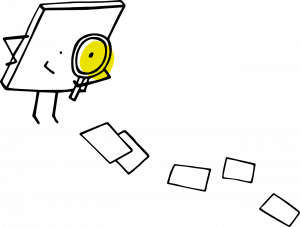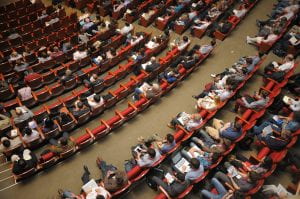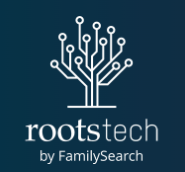This month the #ANZAncestryTime chat was all about conferences we had attended or plan to attend in 2022 but especially RootsTech.
Tips when watching RootsTech
When you watch a session you find particularly useful, don’t forget to check the syllabus that’s available and download it.

Did you participate in all aspects of RootsTech ( main stage, sessions, playlist, expo hall, relatives around me)? What did you enjoy about each of these?
Nearly everyone mentioned they had a long playlist to watch throughout the rest of the year. Many were going to watch the keynotes after they were recorded as timing not always suited to Aussie/NZ times. Many had relatives at RootsTech but most were 8th+ cousins. Some had had replies to messages for those cousins who were closer.
The theme song was very catchy and like by many. Most wanted some sort of PDF created with all the sessions to make it easier to mark off those they wanted to watch. Some found the categories for filtering sessions was not easy to follow. Most followed themes eg Ireland, Scotland, DNA when choosing sessions for playlist.
Much discussion about Live Story from MyHeritage – many felt it was creepy putting words into our ancestors mouths.
If I had a wish for the Playlist it would be the option for another tick box or similar so you can remind yourself you’ve watched a session without removing it.
This year #RootsTech had a link to “Calendar” as part of the menu. This allowed attendees to find day/time for the Main Stage, live sessions, & Expo demonstrations. It helped me to keep focused on the 2022 live sessions for the first 3 days.
My #RootsTech spreadsheet, mainly created for me. Caveats: I only included English-speaking sessions; I assume times on website are MT, so I converted to ET; there may be typos; did NOT include speakers/descriptions. docs.google.com/spreadsheets/d…
I would have like to be able to mark them as watched or have a Watched List
A bit of everything but with a main focus on #DNA sessions. Found the #RootsTech playlist problematic during the event because it couldn’t be ordered by day and time.
I started with DNA, Ireland, Scotland then specific speakers especially England, Australia, New Zealand
I have done that too Sue. Found a speaker I liked and watched all of theirs. One was a series on Scotland records. Most I knew about, but each had an extra record that I now know to try.
I chose two topics. Scotland and DNA. I have watched several talks on DNA and hope to watch one tomorrow as I ran out of time today. I am interested in mtDNA and YDNA.
I’ve been a bit more focused this year, in the hope I’ll actually watch everything on my playlist.
I watched a mix of sessions about Historical Records, DNA, Historical Places and a few others. I liked that they were listed by topic.
I didn’t participate in any live events as I found it hard to navigate and find sessions that I was interested at times that suited me. No cousins closer than sixth. I will definitely revisit some of the recorded sessions over the next few months
I also create a Watched RT2022 playlist for watched ones. This way I know where I am up to with the sessions. I find the playlist great for the conference. In later months I have found Youtube easier to manage as I have many other videos waiting to be watched.
I was quite excited this year to have had Relatives at Rootstech. Only 7 but they were all close Scots who went to America. Last year I have 0. I’ve contacted them but haven’t heard back yet
I confess to being a hopeless #RootsTech attendee. I think I saw just one session but I really enjoyed it. Hopefully I will catch up on more later. There’s never enough time is there to do everything?
each topic on the ethics discussion could have been an hour on its own
I’m saving the DNA talks for when my brain is in fully functioning mode
I’m saving my DNA talks too for when I can take time out and really concentrate
I found Paul Maier’s session on the Million Mito Project fascinating. Lots of good information about mtDNA
I started watching the series of videos by the one speaker rather than the one off.
I did some pre recorded sessions, visited the expo hall, checked out any chat on my two talks and did Relatives at RootsTech but no one really close. I was away from home and internet access not as good plus other things going on.
Watched a couple of live sessions, and now working my way through my playlist – focused on Ireland and NZ. Have enjoyed the ones seen so far!
I prioritised the mainstage and watched them all. Also watched sessions and visited expo hall. Really enjoyed the mainstage especially the dancing.
I listened to most of the keynote speakers and I contacted people via Relatives Around me. I enjoyed the Expo hall and joined the Essex FH Society. I really liked the theme song this year! I made a playlist but as yet have not watched everything.

What new skills, knowledge or perspectives did you gain from RootsTech? Have you put any of these into practice yet?
I just had a play with #Live Story on #MyHeritage tonight and so far have received the thumbs up from my son so think this is maybe the only way to get the younger generation interested in family history. “Way cool” was his response. 🙂
I’m interested in timeline feature / tool also. Useful for finding gaps and illogical facts like being before born before parents too.
I had one third cousin on the list. Have been in touch with some of that family line. Others mostly distant and questionable, with some very dodgy FS trees
Most of the sessions I’ve seen so far have reminded me of record sets I haven’t investigated fully or for a while. Also love hearing about techniques to tackle brick walls – always something to learn.
I watched the BNA one closely, wrote a bit about it for local genealogy magazine, then discovered they had a 30% off discount for a few days so I signed up!
93 in my list of Relatives at RootsTech. 9 people are 3rd cousins once or twice removed. All from a common ancestor in NZ and might be church people also. Nice to see closer matches.
Hi Brooke, As I’m a newbie to DNA I found some sessions and then looked up the name of the presenter, and worked out the order from there.
Last year, in addition to my YouTube playlist, I printed off the list and highlighted ones I was interested in and ticketed off those watched. I did not see a printable list this year.
I had trouble finding speakers or sessions with the search function. Whereas last year I printed it and then highlighted what I wanted. Not very techno but it worked
No new skills gained yet . I have suggested that short videos on using the UKFreeGen sites may be helpful for newbies to WikiTree
I have yet to put any into practice as I have been too busy. I had the excellent @scottishindexes conference last weekend, and I bought a new car as well, delivered today. Once I learn to drive it, I’ll be back to normal stuff.
Haven’t really had a chance yet but did try to confirm the relatives for whom I also had DNA matches. There are so many new things I find it hard to keep up with everything.
I’ll be looking at New York State, New England USA related sessions – Gedmatch’s new features were something I’m working on and I want to look further into DNA Painter and MyHeritage new features
Since watching the DNA sessions, I feel more confident to send off my AncestryDNA kit, first time testing!
I learnt about Jamaican Research. I was very keen for these sessions as I have Jamaican ancestry and wasn’t sure where to begin. I feel confident now to move ahead with my research

Which speakers and sessions would you recommend? How did you connect with others during RootsTech?
checking the sponsors videos for news in the exhibitors hall. FTDNA and DNA Painter! Playing the others at fast speed, skimming the more razzmatazz or advertorial parts, the new features on offer are worth keeping up to date about.
Delighted to say that the recording of my Scavenger Hunt @RootsTechConf workshop is finally online. You can watch here. I’ll be putting up a follow-on Q&A on my blog asap. familysearch.org/rootstech/sess…
finally found out that apparently I am automatically enrolled in the Million Mito project as I have done the ftdna mtdna test
I also liked this one by Beth Taylor – again you may need to watch it serveral times youtube.com/watch?v=bUf8tw… – grouping DNA matches
I liked this one – good tips and tools – it might be necessary to view it a couple of times – youtube.com/watch?reload=9… – searching for close relatives
You’ll also want to read this guide by @legalgen that follows up on the ethics session at #RootsTech. legalgenealogist.com/2022/03/06/the…
I have given a few answers to this re the Scotland talks. But as I have yet to watch most, too early for recommendations. I connected with one speaker who I knew through @WikiTreers. No one connected with me
Joshua Taylor was great as he always is. He’s always my first choice. Fiona Brooker. Nick Barratt. Loved the Aussies. So many great speakers
Really enjoyed @UlsterHistory Gillian Hunt’s session on Irish landed estate records, and @FamHistAcademy Cathie Sherwood’s talk on Irish workhouses. Caught up with some geniemates via Zoom virtual pub sessions.
I recommend Andrea Bentschneider and Katherine Schober for German records
I really enjoyed Fiona Brooker’s session on Recording Memories…a bit different.
Sessions by @DrPennyW were interesting. Also the DNA painter ones are always helpful. others I enjoyed were Johsua Taylor, Tim Janzen, Nick Barratt, Michelle patient, Fiona Brooker, Cheryl Hudson Passey, Dianne Southard, Rob, Hamilton
The main way I connected with others was friends with messaging apps. Suggestions of sessions to watch were useful. I did try the chat however being interrupted by work did not help the conversation.
I’d recommend everyone watch Keynote Maysoon Zayid. She was amazing. Very funny and super inspiring
I had to check my diary. The three are called “Birth in Scotland”, “Marriage in Scotland” and “Death in Scotland”. Another good one was “Secrets of ScotlandsPeople” by Alison Spring.
another issue for me is that virtual conferences are not as interactive personally. It is too easy to say I will watch it later rather than get up early as you would in person.
I thought the roundtable Oz session on brickwalls with Michelle Patient, Fiona Brooker and Deb Carter was dynamic and well hosted. A credit to the regiment 🙂
Being away meant I didn’t really have time to participate but I did follow up comments/ questions on my talks.
didn’t watch speakers just joined some discussions some were poorly attended unfortunately
As noted before – live sessions that @fiona_memories & @patientgenie held. Helps that I am interested in NZ & DNA research. Another I enjoyed was DNA and the Settlers of Taranaki, NZ which was from 2021 and I missed it the first time around.
My Rootstech playlist so far on YT. YTube playlists can be public or private ( have a couple of Shotbox ones in it, just ignore those) youtube.com/playlist?list=…
Karen Evans had some great sessions on UK ancestors on a budget
What’s the LucidChart one? Love using it for displaying DNA matches – will have to check it out.
Its a program that allows you to create flow chats and diagrams and the session used it in conjunction with DNA results and matches

What other online or in person conferences have you attended recently or are you planning to attend this year?
I find the interaction with an in-person conference that makes it better for me. Plus visited close cousins in the USA and UK when in RT was in London
Working on the Christchurch Family History Expo being in person this year. Cross your fingers for us.
Most recent conference attended was @scottishindexes – always worthwhile! Hopefully in-person events here this year for August #FamilyHistoryMonth, and am booked for #FHDU in Sydney in November.
I am going to the @GuildOneName conference next month in Oxford it was postponed for the last 2 years looking forward to meeting in person
I am running talks and workshops at local library but only getting low numbers due to Covid still but allows more specific Q&A
I can’t attend in person conferences as travelling and eating away from home are too difficult for me now. Really pleased that we have these online now. I will attend future @scottishindexes conferences if online.
And I love to hear the Scottish accents. That would have been how my grandfather spoke, but he died when I was two. Such a variety of talks and so much knowledge. Reminds me to download the handouts.
I have attended a couple of online ones in the last year and joined virtual family history society sessions attended a hybrid one last night
I attended tonight so that I could get an idea of what to follow up. And how others participate in this virtual world. If there is a hybrid in 2023 then my intention would be to go in person
I’m a bit nervous about attending a big person to person event but I’ll be still wearing mask and being very careful. I’m keen to start living a covid normal life.
we have other travel plans to Maldives in Dec 2022 and then Scandinavia UK & Portugal in June – July 2023 which will involve some family history road tripping – so $’s won’t stretch to Roots Tech 2023 so hybrid will work better for me
I can’t wait to return to beautiful Norfolk island for @AFFO2015 I’ll see a few genea-friends for the first time in ages!
have been to a few and how I interact depends on how long the talks remain on the website. If you only have 72 hours then I try to watch in person or clear the weekend. If it is longer I usually have the mad rush to watch everything just before it closes.
I attended the @scottishindexes conference last weekend and will be going to Congress on Norfolk Island as well as the Qld State Conference at Redcliffe both IN PERSON! And a few others in between
As I am still wearing a mask when indoors at any shops etc, I wont be doing anything in person only online – hopefully the Female Convict Research sessions in early May and FHDU22 later in the year
I have booked accommodation for the QLD state conference at Redcliffe 21-23 Oct – Sands of Time. sandsoftime.org.au Thinking about the Family History Down Under in Nov or the virtual if I do not go. fhdu22.com
Blogposts about RootsTech sessions
Judy: Dos and don’ts about DNA
Roberta: DNA sessions at RootsTech
Maggie: a Legacy webinar re DNA tools
Readers: What did you find most useful from RootsTech? Why?

